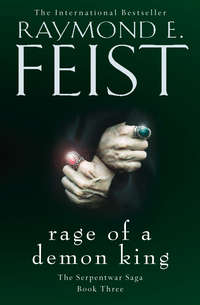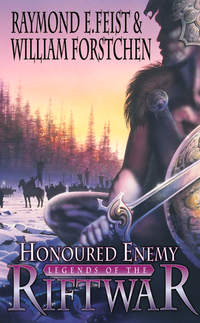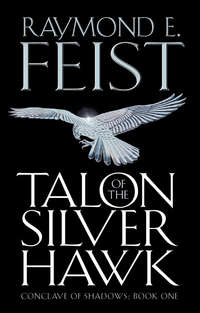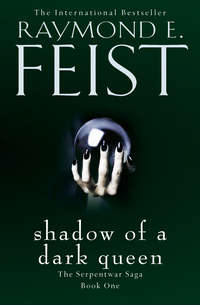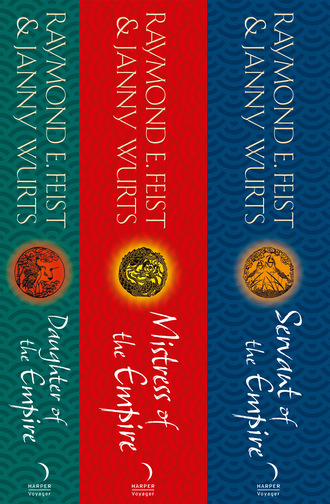
Полная версия
The shadows swelled and slanted, and the li birds began to sing in the slightly cooler air of afternoon. Mara sat by the sacred pool and fingered a flower plucked from a nearby shrub. The petals were pale, delicate in the extreme; like her, they could be bruised and crushed with a clench of the hand. The servants might believe she had retired to the sacred glade to pray for deliverance from the shame brought upon her house by her husband. In fact, she had gone there to escape the fear in their eyes, for if the Lord of the Acoma chose war, their fates also hung in the balance. Some might die fighting, and they would be the fortunate ones. Others might lose all honour by hanging, and many would become slaves; a few might turn to the hills as outlaws and grey warriors. If the natami were stolen, all would know the gods’ disfavour.
The shadows lengthened, and the flower wilted in Mara’s hand, poisoned by the salt of her own nervous sweat. Ayaki wakened in his basket. At first content to bat his fat hands at the insects that flitted to feed on the blossoms above his head, he later grew fussy. The time for his midday meal had long passed. Mara tossed the dead flower away and arose. She plucked a ripened fruit from one of the ornamental jomach trees and peeled it for her infant. The boy quieted as he chewed the sweet fibre. Only then did Mara hear the footsteps approaching from behind.
She did not turn around. With Papewaio on guard at the gate to the glade, this would be no assassin. Priests of Chochocan did not enter unasked; gardeners did no work while master or mistress used the glade; and no other could enter without earning a sentence of death. The only person living who could walk these paths at this hour with impunity was the Lord of the Acoma. The fact that he had arrived home from his town house in Sulan-Qu without fanfare told Mara only one thing: he had seen his father, and his disgrace in the eyes of the Warlord and his insult to the house of his birth had caught up with him.
Mara eased the last bit of jomach into Ayaki’s eager mouth. Aware that her hands were shaking, she made a show of blotting her sticky fingers just as Buntokapi reached the far side of the sacred pool.
He stopped on the walk, his sandals showering a fine spray of gravel into the water. Reflections shattered into a thousand fleeing ripples, and the li birds fell silent in the branches overhead. ‘Wife, you are like the pusk adder of the jungles, whose markings are pretty enough to be mistaken for a flower when it lies at rest. But its strike is swift and its bite is fatal.’
Slowly Mara rose. She turned reluctantly, her fingers stained red with jomach juice; and she looked upon the face of her husband.
He had come from town at speed, without his litter of state, for his broad features were whitened with a thin layer of dust from the road. He wore a simple day robe, probably the same he had donned when his father’s knock had roused him from bed; this, too, was filmed with dust, which hid the wine stains that spoiled the embroidery on one cuff. Mara’s gaze followed the knotted cords of his belt, the well-worn leather of his sword, and the slice of muscled chest revealed through the opened collar of his robe. She saw the marks of Teani’s passion still visible on the skin over his collarbone, and the hard set of his lips. Lastly she looked into his eyes, which showed a mixture of thwarted anger, childlike confusion, and longing.
Unaware that in the eyes of her husband she was beautiful and, in a strange way, untouchable, Mara bowed. The only words she could think to utter felt wrong.
Buntokapi stared at her with an intensity that hurt to witness. ‘And like the pusk adder, my wife, your venom stops the heart. You play the Game of the Council with masterful precision. How could you know which face I would wear, the Anasati, whose blood and birth were mine, or the Acoma, whose honour I pledged to preserve with a vow?’
Mara willed her rigid posture to relax. But her voice shook ever so slightly as she said, ‘The Acoma family is ancient in honour. No Lord of that name has ever lived in shame.’
Buntokapi stepped sharply forward, his legs easily spanning the breadth of the ceremonial pool. Towering over the slight form of his wife, he bent and caught her wrists. ‘I could change that, proud woman. At a stroke, I could make the honour of your forebears as dust in the wind.’
Forced to look into his angry eyes, to feel the strength of a man she had not cherished, Mara needed all her will to hold steady. A minute passed heavy with threat. Then the darting play of the insects that fed among the flowers inspired Ayaki to spontaneous laughter. Buntokapi looked down and noticed the weals his handling had left on Mara’s flesh. He blinked in embarrassment and let her go, and it seemed to her as she watched that something vital drained from him. Then he straightened, and a look that she had never known crossed his face.
‘Perhaps I was wrong, the day we married,’ said Buntokapi. ‘Perhaps I am indeed as stupid as you and my father and my brothers believed. But for the sake of my son, I will die bravely as an Acoma.’
Mara bent her head. Suddenly she had to fight to suppress tears. For one brief instant she had perceived the man her husband might have been had he been raised with the love and the care that had all fallen to his elder brothers. The Lord of the Anasati might have done little to foster the potential of this, his third, son; but she had played upon Buntokapi’s inadequacies until she achieved the end she had desired. Mara felt pain within; when she should feel triumph, she instead knew grief. For in this one moment she saw that Buntokapi’s potential for greatness, now glimpsed like the hint of sunlight through clouds, should be wasted so soon in death.
But the poignancy of the moment lasted only a second. Buntokapi caught her arm in the bruising grip of a warrior and pulled her roughly to his side. ‘Come, wife. Fetch our son from his basket. Before the sun sets this day, you shall both see what it takes to die like a Lord of the Acoma.’
Unthinkingly Mara offered protest. ‘Not the child! My Lord, he’s too young to understand.’
‘Silence!’ Buntokapi pushed her roughly, and distressed by his shout, Ayaki began to cry. Over the child’s wails, the Lord of the Acoma said, ‘I die for the honour of my son. It is right that he should remember. And you.’ He paused, his lips curled in malice. ‘You shall witness what you have wrought. If you would engage in the Game of the Council, woman, you must know that the pieces you manipulate are flesh and blood. For the future, if you continue, it is right that you should remember.’
Mara picked up Ayaki, hiding her distress in concern for her child. As Buntokapi’s steps retreated from the grove, she paused, battling a strong urge to weep. She had thought she understood the stakes of her position when she grieved after the murder of her father and brother. But now Buntokapi had shown her the scope of her ignorance. Feeling humbled, and inexplicably dirtied, she held Ayaki closely. Her husband’s command must be obeyed. Somehow she must find the resilience to weather the final, bitter fruits of her victory. If she did not, the Minwanabi waited with plans to ruin her, even as ruthlessly as she had plotted the downfall of Buntokapi to secure herself immunity from Anasati treachery.
The soldiers of the Acoma stood rigidly in a square, the plumes of the officers’ ceremonial helms tugged by the gentle breeze that sometimes blew before sundown. Within the formation waited Keyoke, Papewaio, and another warrior sent by the Anasati to act as witness; and between them, clad in the red robes of ritual, bound with a sash of Acoma green, Buntokapi lifted a sword that was also red, and sharpened to the keenest edge Tsurani armourers could fashion.
Outside the square, but afforded a clear view by the slight rise of ground, Mara shifted Ayaki’s warm weight to her other shoulder. She wished the proceedings were done with. Ayaki was wide awake and playful, tangling small fists in her hair and gown, and exclaiming brightly over the warriors in their colourful lacquered armour. Like all things Tsurani, even death had an element of ceremony. Buntokapi stood statue-still in the centre of the square, the blade that awaited his end in his hands, while Keyoke recited the list of the honours he had earned as Lord of the Acoma. The account was very short: one battle and a dozen wrestling matches. Mara swallowed stiffly, aware as never before how young her husband really was. Tsurani faces aged slowly, which made it easy to forget that Buntokapi was barely twenty, a scant two years older than herself.
Straight, still, every inch the warrior despite his bandy legs, he showed no weakness in his bearing, but something about his eyes reflected the desperate determination needed to see this moment through. Mara swallowed again and gently pried Ayaki’s fingers off the lobe of her ear. He shrieked with laughter, ready for more of such play.
‘Hush,’ scolded Mara.
In the square, Keyoke finished his speech. He bowed deeply and said, ‘Go in honour, Lord of the Acoma. Let all men remember your name without shame.’
As he straightened, each warrior simultaneously removed his helm. The breeze pushed damp locks back from sweating faces; emotionless eyes watched the sword Buntokapi lifted above his head.
Mara swallowed again, her eyes stinging with salty tears. She tried to think of Lano, sprawled and bloodied under the hooves of barbarian horses; but the sight of Buntokapi, standing in failing sunlight with his sword raised in final tribute to the gods of life, was far too real to put aside. Except for his crudeness in bed, and his explosive temper, he had not been an oppressive husband – had Mara used the same manipulations to mould him instead of destroy him … No, she commanded herself, there can be no regret. She called upon the discipline she had learned in Lashima’s temple and banished such thoughts from her mind. Without expression she watched Buntokapi turn the sword and set the blade point against his stomach.
He offered no final words. But the eyes that met Mara’s were dark with irony and a strange admiration mixed with the triumph of knowing she must live with this moment for all her living days.
‘Before the sun sets this day, you shall both see what it takes to die like a Lord of the Acoma,’ he had said to her in the grove. Mara’s hands clenched reflexively in the folds of Ayaki’s clothing as Buntokapi lowered his head. Large hands, clumsy on the body of a woman but capable in wrestling and war, closed on the red-laced leather of the sword. Lowering sunlight gilded the sweat on his wrists. Then his knuckles tightened. He took a swift, running step and dived forward. The pommel of the weapon rammed cleanly against the earth. The blade drove through his body. Hands and hilt struck his breastbone, and he grunted, his body gone rigid with agony.
He did not cry out. A sigh left his lips while the life bled swiftly through his fingers and mouth. As the spasms of his muscles slowed, and almost stopped, he turned his head. Lips caked with dust and blood framed a word that no man heard, the dead eyes stilled upon the figure of the woman and child who stood on the hillock above.
Ayaki began to wail. Mara loosened hands that gripped his young body too tight, and by the ache in her chest realized she had stopped breathing. She drew a painful breath. Now, mercifully, she could close her eyes. But the image of her husband’s sprawled body seemed inscribed in the inside of her eyelids. She did not hear Keyoke pronounce the Lord of the Acoma dead, with all honour; instead, the phrases Buntokapi had spoken in the grove returned to haunt her. ‘If you would engage in the Game of the Council, woman, you must know that the pieces you manipulate are flesh and blood. For the future, if you continue, it is right that you should remember.’ Confronted by a rising tide of implications, Mara did not notice the men who replaced the helms upon their heads and bowed to the departed. Time and events seemed frozen upon the moment of Buntokapi’s death, until Nacoya’s wiry grip caught her elbow and steered her purposefully back towards the estate house. The old nurse did not speak, which was a mercy, though Ayaki cried for what seemed a very long time.
Once she had donned robes of mourning, Mara retired, not to her bedchamber, as Nacoya preferred, but to the west-facing room that had been her father’s study. There she watched the shatra birds fly across a sky brilliant with sunset. But the crimson colours only reminded her of Buntokapi’s robes, and of the bloodied sword that had taken his life. As twilight fell, the servants lit the glass-shuttered lamps and closed the screens against the dew. Mara regarded the chamber that, as a child, she had considered to be the heart of her father’s financial empire; the sanctum was no longer the same. The desk lay piled with documents pertaining to Buntokapi’s gambling and betting exploits: most would be debts, as Mara knew from the woebegone manner assumed by Jican these past weeks. The screens bore new paintings, ones the late Lord had preferred to the hunting scenes Mara’s great-grandfather had commissioned. These showed wrestlers and war scenes, and one, near the desk, showed a woman with ruddy hair.
Mara bit her lip in distaste. At first she had thought to restore the decor to the one she had known when her father and Lano were still living. Now, with the dust of the barracks unwashed from her feet, and Buntokapi’s suicide still stark in her mind, she decided otherwise. Her childhood was behind her. Now, if the Acoma name were to survive, she must accept changes in herself, for the Game of the Council elevated the strong, while the weak perished or fell into ignominious obscurity.
A tentative knock sounded at the screen. Mara started, turned, and said, ‘Enter.’
Jican hastened through the screen. For the first time in weeks, he carried neither documents nor needra tallies; his hands were empty, and in agitation he bowed and touched his forehead to the floor at the feet of the Lady of the Acoma. Startled, Mara said, ‘Hadonra, please rise. I am in no way displeased with you or the way you have handled your duties under the rule of my late husband.’
But Jican only trembled and bent lower, a figure of abject misery huddled on the fine tiles of the floor. ‘Mistress, I beg forgiveness.’
‘For what?’ Puzzled and trying to set the servant at ease, Mara stepped back and settled herself on the cushions where she and the hadonra had sustained many a lengthy discussion of estate finances in the past. ‘Jican, please rise and speak plainly.’
The hadonra raised his head but did not leave his knees. He did his best to assume the proper Tsurani restraint, yet managed only to look contrite. ‘Mistress, I bring shame to the Acoma. Strive as I might, I cannot –’ He broke off and swallowed uncomfortably. ‘Lady, grant me mercy, for I cannot feel grief as I should for the death of the great Lord. He passed with honour and bravery and deserves to be mourned. Yet, in honesty, I cannot feel other than relief.’
Mara lowered her eyes, discomforted by the hadonra’s distress. She picked at a tassel that had torn loose from the corner of one cushion, and reflected soberly that she felt no true grief for Buntokapi. But the shock of the realities of the stakes she had manipulated left her shaken, unbalanced, and confused. Her conscience might sting for her deed, but she felt none of the tortures of cultural loyalty displayed by the man before her. In an analytical vein, she wondered whether this diminished her spirit.
The hadonra shifted uncomfortably, and Mara realized she must react, if only to speak some words of comfort that she could not genuinely believe. ‘Jican, all know that you suffered great tribulations under the command of my late husband. He did not appreciate your virtues, and he did not heed the wisdom of your advice. You served in perfect loyalty while Buntokapi was alive. Now he is your ruler no longer, and I say wear the red wristbands of mourning. Act in seemly fashion, for tradition must be honoured, but trust your heart. If you cannot mourn, then at least honour Buntokapi’s memory.’
Jican bowed low, his nervous manner reflecting profound relief. A harder mistress, he knew, might have asked him to take his life. But with time he had come to appreciate that Mara saw more than most rulers when it came to interpreting the mores of culture. And even her most dedicated adversaries must admire the boldness with which she had dispatched the Anasati threat.
Mara sat alone for long hours after her hadonra left. The feelings in her heart were far more difficult to sort than those of her servant. She watched the lamps burn low, and pondered, and sometimes dozed. Dreams came to her, of Lanokota wearing red, and of her father spitted on the points of barbarian weapons. Sometimes his body changed, became that of Buntokapi, and sometimes Lano lay in the dust while Keyoke pronounced him dead with all honour. At other times her mind was anguished by the sound of Ayaki’s crying, which seemed to go on and on with no end. Towards dawn she woke, sweating and chilled. The candles had burned out, and moonlight streaked the screens, throwing silver-grey patterns on the tile. Mara lay still and, through the debris of her emotions, analysed the one fact that mattered. She felt sorry for Buntokapi, but she did not regret her choices. Service within the temple of Lashima might once have preserved the peace and purity of spirit she had known during girlhood; but having tasted power, and the thrill of the Game of the Council, she now knew she could never give them up.
Breeze rustled the akasi bushes, wafting the soft scent of flowers over the smells of ink and parchment. Mara lay back against her cushions, her eyes half-closed. In solitude, she granted her husband the one parting tribute she could believe in: he had shown her a moment of greatness, that afternoon in the glade. His own father had squandered that potential, and she had pandered to Buntokapi’s faults, for her own selfish gain. Those things could not be changed. But the future lay like a blank parchment. Mara could ensure that Ayaki was raised differently, that the courage and strength of his father never soured into stubbornness. Once she had vowed to train out of Ayaki anything of Bunto, and to foster whatever was Acoma. Now she knew that Ayaki had gifts from Buntokapi that would be foolish to waste. By loving him, and nurturing him, and letting him develop his gifts, she could raise a son of the Acoma that would make even the Anasati proud; and that she vowed would be so.
• Chapter Eleven • Renewal
Mara listened to the water.
The tiny stream that ran from the pool in the Acoma contemplation glade splashed softly as it rippled over rocks along its course. The wind gusted through the tree branches, a fitful sound that matched Ayaki’s fussy mood. He looked on unsmiling as his mother raised the urn containing his father’s remains. The ceremony of mourning was too much for his young mind to encompass; he knew only that the breeze chilled him and his mother wouldn’t let him crawl off to play.
Mara experienced neither sorrow nor regret as she poured Buntokapi’s ashes into the hollow beneath the Acoma natami. Her husband was dead, and the Lord of the Anasati mourned a son, even if only a poorly loved third son. Tecuma’s bitterness would be doubled, for Buntokapi’s end had been contrived by one beyond reach; as his mother of the only Anasati grandson, Mara was exempt from reprisal. Yet the girl herself felt no victory. Wind gusted sharply, tearing at her robe. Mara shivered. She must never allow herself to regret. What had been done was past, and necessary; to think otherwise was to be troubled by worse than her husband’s angry shade. If doubts, even uncertainty, were permitted to grow, she risked paralysing her ability to make decisions in the future. That would surely consign the Acoma to eventual obliteration at the hands of enemies, for the Game of the Council would go on. Regret must be banished, despite her momentary sorrow, and indecision must be forever kept at bay.
For the second time in less than two years, Mara performed the ritual of mourning. Only now, instead of pain locked deep within, there was sadness. Sezu had taught that death was a part of politics, but now she understood that the forms were simply a rationale to justify murder. That awakening left her uneasy.
Mara sought comfort in a silent prayer, addressed to the shade of her husband. Buntokapi, she thought, for whatever rest it will bring your spirit, at the last you died with dignity. For a moment, no matter how briefly, you were worthy of the name Lord of the Acoma. For that I honour you. May your journey around the Wheel bring you better reward in your next life.
Now Mara rent her clothing, cut her arm, and placed ashes between her breasts. Ayaki stirred restlessly at her side, having tossed away the beads Nacoya had loaned to keep him occupied. Mara tore the baby’s wrap and smudged ashes on his tiny chest. He looked down and made a face. Tough as his father, Ayaki would not cry when Mara pinched him; instead he stuck his lower lip out and scowled belligerently. With the ceremonial dagger Mara pricked the boy’s forearm, earning a wail of protest to complete the ritual. She held Ayaki’s arm over the pool, letting his blood mix with her own in the water.
Tears came easily then. Alone and free from the scrutiny of hovering advisers and servants, Mara admitted her inner fear: that she was not equal to the next round of the Game of the Council. The humiliation and pain she had suffered at Buntokapi’s hands, the doubt and the anguish as she plotted his downfall, and each danger endured to survive the murder of her father and brother – all these might still be as nothing, blown away by the winds of circumstance and political fortune. The Minwanabi never slept in their hatred of the Acoma. Sometimes Mara felt helpless beyond hope.
Seeking the stability of the practical, she dressed Ayaki in the tiny ceremonial gown left for him. Then she donned her own white robe, silenced her wailing son, and carried him through the gusty afternoon to the grove’s entrance.
The noise warned her first that visitors had arrived. Armour clanked in the yard, and the excited voice of a servant carried over the sigh of wind through leaves. Mara tightened her fingers around Ayaki’s solid warmth, earning a wiggle of protest. Tense with apprehension, she stepped around the shielding hedges and almost collided with Keyoke’s weaponed bulk. The old Force Commander had positioned himself squarely across the entrance, and by the keepers left loose on his buckles, Mara realized he had pulled his ceremonial armour on with the greatest haste. The visitors, then, would be significant.
‘Anasati?’ she queried softly.
Keyoke returned a terse nod. ‘Papewaio and Nacoya await you, Lady. And Lujan oversees the arming of two companies at the barracks.’
Mara frowned. Keyoke would hardly have mentioned such precautions if Tecuma had come with peaceful intentions; her fears were confirmed as the Force Commander deliberately raised a hand and scratched his chin with his thumb.
Mara took a deep breath, ducking as Ayaki swung a playful fist. ‘Lashima reward your foresight, Keyoke,’ she murmured. And her pulse quickened as she stepped past the hedge, into view.
The yard was jammed with an assemblage of courtiers, warriors, and servants, all dusty from travel by road and wearing armour that was serviceable and plain, not the fancy enamelled style worn on state visits. A loud patch of colour in his house colours and plumes of mourning, the Lord of the Anasati sat patiently upon his litter, his adviser Chumaka at his right hand. Silence fell as Mara approached, Nacoya and Papewaio falling into step one pace behind. The Anasati soldiers assumed formal poses and formation as the Lady of the Acoma bowed, as slightly as possible without giving offence to one of Tecuma’s rank.
‘Welcome, father of my husband.’
‘Greetings, daughter,’ he said bitterly. ‘I see the son of my son in your arms. May I view him?’


